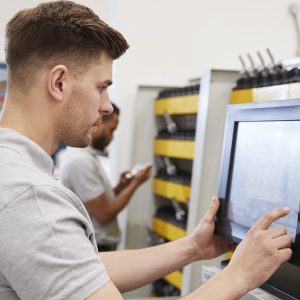Mechanical Engineering Craft

Mechanical Engineering Craft
City & Guilds L2 Certificate in Manufacturing Technology (2850-20)
The engineering industry is a diverse sector which offers a variety of jobs and progression opportunities for people who are interested in the design, manufacture and maintenance of mechanical systems and components.
Is this course right for me?
You will spend time in our industry standard workshops developing the practical skills needed to progress into the engineering industry alongside time spent in the classroom gaining theoretical knowledge that compliments your practical experience.
This course is designed to develop your skills needed to progress to higher level study or an apprenticeship.
Mechanical Engineering does not include any motor vehicle related modules or training, please see our Automotive Engineering courses.
What are the entry requirements?
- Two GCSEs at grade D or above (may include one relevant equivalent) to include English Language/First Language Welsh and Mathematics/Numeracy
- Each application is considered on individual merit
- Entry is subject to attending a course information session or informal interview
Current student - what are the entry requirements?
- Successful completion of relevant Level 1 programme with a merit grade or above in addition to a successful decision from progression board meeting
What will I learn?
This course will give you a solid foundation in the principles of mechanical engineering, welding, fitting and machining.
Units to be studied include:
- Working in engineering- This unit covers the underpinning basic skills and knowledge needed to function in engineering or manufacturing sectors. It covers the need to recognise and use safe working practices, consideration of the environment and working effectively as a part of a team. It includes the methods of communication that engineers use in their everyday.
- Principles of engineering technology- This unit covers basic principles of mathematics and science, along with the materials technology that underpin engineering applications. It covers common applied engineering mathematics and scientific calculations and materials selection in terms of types, common forms of supply, properties and methods of changing their properties.
- Principles of manufacturing technology – This unit covers methods of manufacture. It includes the range of functions found in manufacturing organisations and will provide the learner with the knowledge to plan the manufacturing production of routine engineering components by the most economic manufacturing methods.
- Machine components using turning techniques – This unit covers a broad range of turning activities that are required in the engineering and manufacturing sectors. It covers skills and knowledge needed to produce turned components in different materials, using appropriate tools and equipment, and inspection techniques to achieve the required tolerances and conforming to specifications, whilst complying with health and safety legislation and regulations. It covers the underlying process in producing components that require shafts of various lengths and shapes (including boring and reaming).
- Using bench fitting techniques – This unit covers a broad range of fitting activities that are required in the engineering and manufacturing sectors. It covers skills and knowledge needed to produce components for assembly using appropriate tools, different materials and inspection techniques to achieve the required tolerances and conforming to specifications, whilst complying with health and safety legislation and regulations.
- Welding by MIG process – This unit will enable metal inert gas (MIG) welding skills to be developed to meet the defect acceptance requirements of BS 4872 part 1. Topics include: health and safety hazards and methods of avoiding them, preparation, electrical requirements, consumables, welding techniques, welding positions, distortion control and rectification, BS 4872 part 1 requirements and non-destructive and workshop testing.
Will I need to study additional English & Maths skills?
You may need to study an additional skills course depending on:
- the course you are taking at College
- what grades you gained in your GCSE Maths and/or English Language
Click below to find out what skills course you may be taking at College.
If you are studying a Workbased qualification:
- Essential Skills Wales (ESW) in Application of Number and Communications, for Progression pathway programmes within the Built Environment Faculty only
All other courses:
- Upskilling Destination Programme – an hour and half session a week developing essential research skills, critical thinking, and academic writing techniques, supporting literacy, numeracy, digital literacy and employability skills
If you are studying a Workbased qualification:
- Essential Skills Wales (ESW) in Application of Number and Communications, for Progression pathway programmes within the Built Environment Faculty only
All other courses and those who have progressed through the internal progression route:
- A one year GCSE Resit Programme in GCSE Mathematics Intermediate Tier (Welsh or English medium) / GCSE English Language
If you are studying a Workbased qualification:
- Essential Skills Wales (ESW) in Application of Number and Communications, for Progression pathway programmes within the Built Environment Faculty only
All other courses and those who have progressed through the internal progression route:
- A one or two year pre-GCSE upskilling course in required subject/s – The priority of this programme (Foundation Maths for Mathematics pathway) is to build fundamental skill and knowledge, to prepare learners for progression onto the one-year, intermediate tier resit programme.
If you are studying a Workbased qualification:
- Essential Skills Wales (ESW) in Application of Number and Communications, for Progression pathway programmes within the Built Environment Faculty only
All other courses:
- A one year pre-GCSE upskilling course in mathematics – The priority of this programme is to build fundamental skill and knowledge, to prepare learners for progression to the Foundation Maths programme.
If you are studying a Workbased qualification:
- Essential Skills Wales (ESW) in Application of Number and Communications
All other courses:
- Upskilling Destination Programme – an hour and half session a week developing essential research skills, critical thinking, and academic writing techniques, supporting literacy, numeracy, digital literacy and employability skills
- A one year GCSE resit course in required subject/s
- Essential Skills Wales (ESW) in Application of Number and Communications, for Progression pathway programmes within the Built Environment Faculty only
For English:
- A one or two year pre-GCSE upskilling course in required subject/s
- Essential Skills Wales (ESW) in Application of Number and Communications, for Progression pathway programmes within the Built Environment Faculty only
For Maths:
- A one year GCSE resit course in required subject/s
- Essential Skills Wales (ESW) in Application of Number and Communications, for Progression pathway programmes within the Built Environment Faculty only
- A two year pre-GCSE upskilling course in required subject/s
- Essential Skills Wales (ESW) in Application of Number and Communications, for Progression pathway programmes within the Built Environment Faculty only
Learners studying on a Jobs Growth Wales (JGW+) programme will be timetabled into literacy and numeracy sessions. To discuss the opportunity of attending a GCSE resit programme, in addition to their JGW+ timetable, please contact skills@pembrokeshire.ac.uk
Can I do this course in Welsh?
Learners have the option to complete course assessment/assignments or elements of the course through the medium of Welsh or bilingually. Visit our Welsh Language in the College page to find out what else is available to you.
How will I be assessed?
- Continuous assessment during the course
- Practical examination
- Written examination
- Online examination
What can I do next?
This course can lead to numerous career opportunities including: Tool Maker, Quality Control Technician, Mechanical Maintenance Engineer, Welder (Construction, Plating, Pipe Fitting), Composites Manufacturer, Production Engineering Improver, Production Engineer, Machinist, Materials Testing Engineer, Designer.
Following successful completion of this course learners could look to progress to a higher level course at the College, seek an appropriate Apprenticeship or go directly into employment.
Do I need to bring/buy any equipment?
- Stationery - you will be told about any specific items before you start the course
- Engineering flame retardant coveralls - £35
- Engineering safety boots - £14/£35
- You may be eligible for funding. Find out more on our student finance page
Any costs above are approximate and may change.
Are there any additional costs?
- No tuition fee
- We are waiving the Administration Fee for the academic year 2025/26
- You will need to pay a £60 engineering workshop fee each year before you start the course
- You can rent a locker for £10 per year this will be refunded if the locker remains undamaged and keys are returned
- You may be eligible for funding. Find out more on our student finance page
Any costs above are approximate and may change.
Additional information
| Level: | |
|---|---|
| Mode: | |
| Duration: | 1 year |
Sports Academy: While on this course you may be able to join our Sports Academy, if you have a talent for sport, find out what we offer on our Sports Academy page.



